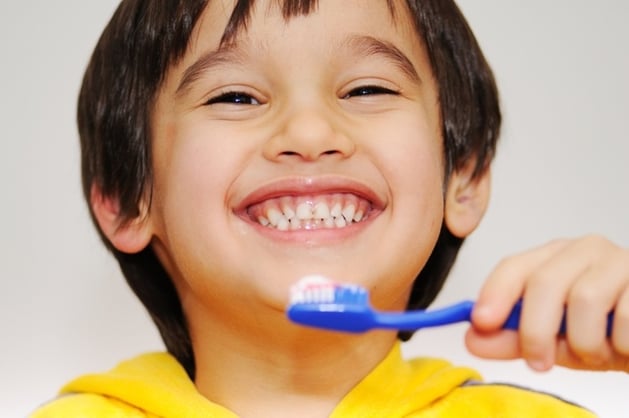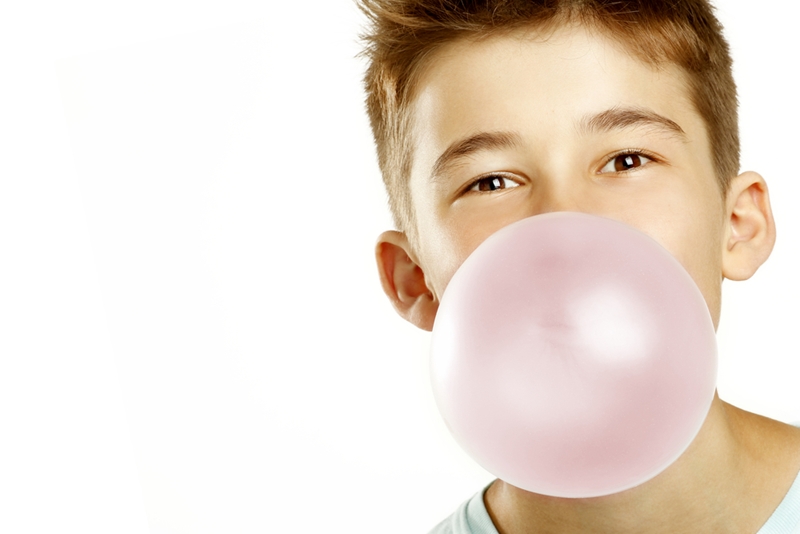
Oral health is something that must be tended to throughout life, and that care should start in early childhood. You can't always monitor everything your kids eat, and there's no telling if they really brushed their teeth. Therefore, it's vital to motivate your kids to take responsibility for their own health. Here are some dental care tips for kids and advice on explaining the seriousness of common dental issues:
Common oral health problems for kids
Plaque and tooth decay are two common dental health problems faced by children every day, as one leads to the other. In fact, about 20 percent of children ages 5 to 11 have at least one decayed tooth, otherwise known as a cavity, that has not been treated.1 A cavity is basically a tiny hole in the tooth that will continue to grow until it gets taken care of by a dentist. Make cavities more relatable for your kids by explaining that between your child and four of his or her friends, one of them probably has an untreated cavity. Presenting this issue in a more realistic way will help kids understand the full scope of the problem and that they are at risk if they don't take proper care of their teeth.
"When mixed with food like sugary drinks and candy, plaque turns to acid."
Plaque leads to tooth decay, and it can only be combated with proper brushing and flossing. Though it can be sticky, plaque is a clear film that is constantly forming on the teeth, meaning your kids won't be able to see it. Explain that just because it's not visible, that doesn't mean plaque is not there. Ask your kids if their mouth ever feels bad, sticky or fuzzy when they wake up in the morning. That's plaque forming on their teeth as they sleep.2 When mixed with food like sugary drinks and candy, plaque turns to acid, which is what makes the little cavity hole. Therefore, this invisible predator in their mouth needs to be brushed away every morning and night to prevent cavities.
Is the Pixy Stick worth the price?
The synthesis of plaque and sugar in your child's mouth can be a dangerous combination. When mixed together, plaque and sugar create acid. Each time sugar is consumed, another acid attack occurs, which can cause cavities or make existing ones even worse. Since kids are notorious for eating sweets, this is a common dental problem for them, not to mention all the other health issues caused by poor diet choices. Get your kids off to a healthy start by teaching them about the major food groups, and incorporate a balanced diet into all of their snacks and meals.
However, kids might not be able take their future well-being into consideration when making health-related choices, but nobody likes to feel pain in their mouth. Cavities can cause the teeth to become more sensitive to hot, cold and sweet food and drinks.3 Plus, getting a cavity filled is never a pleasant experience, especially if the damage is severe enough for a root canal. Teach your kids that cavities aren't just an issue of health, but they can cause pain and discomfort, too.
 The sugar in gum can react with plaque to create acid.
The sugar in gum can react with plaque to create acid.Other ways parents can help
After teaching the importance of having a healthy smile, you need to provide kids with the appropriate tools for maintaining oral care. Dental health care for adults is different than that for children, so the toothbrush, toothpaste and floss you use may not be suitable for your kids.
For proper brushing, your child should always use a soft toothbrush with polished nylon bristles that's small enough to easily fit in his or her mouth.4 Avoid using firm brushes, especially for kids who might not have complete control over how hard they are brushing. If the bristles aren't soft enough, brushing could cause damage to and cuts on the gum, which could lead to gum disease and other infections. If your child's mouth is bleeding after brushing, that might be a sign the toothbrush is too firm. As long as you stick to these criteria, you can let your children pick out their own toothbrushes. This will make brushing their teeth fun and kid-friendly.
Always have your kids brush with toothpaste that contains fluoride. Fluoride is a mineral that is found naturally in water sources, and it is a crucial tool for fighting tooth decay.5 Toothpaste containing this mineral strengthens the teeth, making them more resistant to acid. Fluoride can also remineralize the teeth, effectively reversing damage that's already been done in the mouth.
As for flossing, parents should perform this task on their kids' teeth daily as soon as the teeth start to fit closely together.6 Practice this with your kids every day to teach them the importance of making flossing a regular routine. By age 10, your children should be able to floss their teeth by themselves.
In parenting, it's always important to lead by example. Implement these dental care tips into your everyday routine, and your kids will understand the value of a clean, healthy smile.
1. "Selected Oral Health Indicators in the United States, 2005–2008," Bruce A. Dye, D.D.S., M.P.H, et. al., Centers for Disease Control and Prevention, May 2012. http://www.cdc.gov/nchs/data/databriefs/db96.pdf
2. "Module 2: 'Plaque Attack!'" American Dental Association. http://www.ada.org/~/media/MouthHealthy/Files/Kids_Section/Educators Materials/lifetime_module02_plaque_attack.ashx
3. "Dental Cavities," The New York Times, May 11, 2015. http://www.nytimes.com/health/guides/disease/dental-cavities/overview.html
4. "Choosing the Right Toothbrush - Soft, Medium or Firm," Adam Sinicki, HealthGuidance.org. http://www.healthguidance.org/entry/16193/1/Choosing-the-Right-Toothbrush--Soft-Medium-or-Firm.html
5. "Fluoride Supplements," American Dental Association. http://www.ada.org/en/member-center/oral-health-topics/fluoride-supplements
6. "When to Start Flossing," Oral-B. http://www.oralb.com/topics/when-to-start-flossing.aspx
